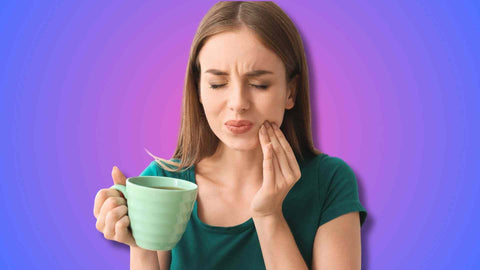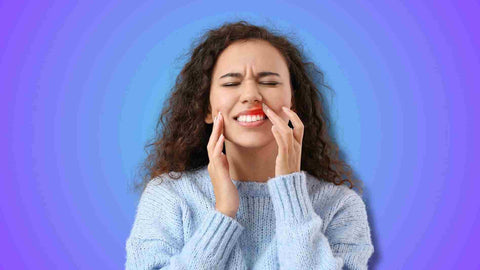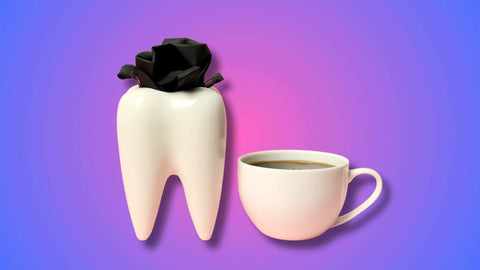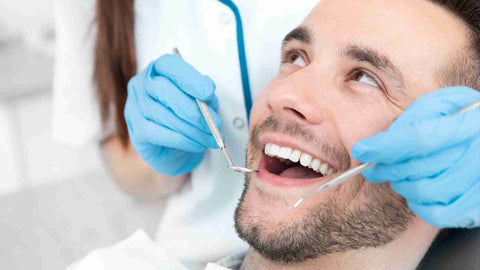Does Coffee Cause Cavities? A Dentist Explains
No, on the scale of things that cause tooth decay, coffee is generally not considered to cause cavities. In fact, drinking coffee, especially when consumed in moderation and without added sugars, might not directly cause cavities and could potentially offer some protective benefits against them.
This is because black coffee has compounds with antibacterial properties effective against cavity-causing bacteria like Streptococcus mutans. By inhibiting the growth of these bacteria, coffee can play a role in reducing the risk of developing cavities.
However, it's crucial to remember that coffee is acidic, which can erode tooth enamel over time if you drink it excessively. This erosion makes your teeth more vulnerable to decay.
It's the same phenomenon we see with tea and cavities.
To ensure that your coffee habit doesn't lead to cavities, consider enjoying your coffee black and limit your intake to avoid the acidic effects on your tooth enamel.
It's also important to maintain a consistent oral hygiene routine, including brushing with nano hydroxyapatite toothpaste twice a day and flossing daily, as these practices are your best defense against demineralization and tooth decay.
After drinking coffee, rinsing your mouth with water can help neutralize the acid and reduce the potential for staining.
In this article, I'll explain everything you need to know about how coffee affects your teeth and whether it causes cavities.
First, is coffee bad for your teeth?

While not exactly bad for your teeth, coffee does have some drawbacks when it comes to dental health. The primary concern is staining.
You see, coffee beverages contain tannins, which are compounds that cause color pigments to more readily stick to your teeth. Over time, this can lead to tooth discoloration, such as noticeable yellowing or browning of the enamel.
Additionally, coffee's acidity can contribute to the erosion of tooth enamel. This erosion makes our teeth more susceptible to decay and can increase sensitivity, as the protective outer layer of the teeth wears down.
However, it's not all negative, and coffee can provide some other health benefits. Consuming coffee in moderation and practicing good oral hygiene can mitigate many of these effects. Some studies even show coffee intake, in addition to green tea, can have positive effects in individuals with gum disease.
For example, rinsing your mouth with water after drinking coffee, using a straw for iced coffee to minimize contact with your teeth, and maintaining a regular brushing and flossing routine can help prevent staining and protect your enamel.
So, while your morning cup of coffee can pose some risks to your dental health, you don't have to totally curb your coffee habit. In fact, with the right care, you can still enjoy your favorite brew without significant harm to your teeth.
How does coffee consumption affect our oral health?

Coffee can impact your oral health in several ways. On one hand, it's known for causing teeth staining due to the tannins it contains. These compounds make color pigments stick to your teeth more readily, leading to yellowing or browning over time.
Additionally, coffee's acidity can wear down your tooth enamel, making your teeth more prone to decay and sensitivity. This is because the acid softens the surface of your teeth, allowing for easier erosion.
Also, caffeine in coffee can reduce saliva production, leaving your mouth drier and more susceptible to decay since saliva plays a crucial role in neutralizing acids and washing away food particles.
However, it's not all doom and gloom when it comes to coffee and oral health. Coffee also boasts antibacterial properties and is rich in antioxidants, which can offer some protection against oral pathogens and gum disease.
To enjoy your coffee without compromising your dental health, consider rinsing your mouth with water after your coffee break to minimize staining and neutralize acidity. Also, you should practice moderation in your coffee consumption and maintain diligent oral hygiene, including regular brushing with nano hydroxyapatite toothpaste and flossing.
By following these steps, you can continue to savor your coffee while keeping your smile bright and healthy.
What causes cavities?

Tooth demineralization, tooth decay, and cavities are primarily caused by the interaction of acids with tooth enamel. These can be dietary acids or simply acids produced by the bad bacteria in our mouths. Let's walk through some of the main causes of demineralization.
Bad Bacteria & Plaque
Dental plaque is a thin, sticky film that naturally forms on our teeth. It consists of bacteria colonies that feed on sugars and carbohydrates from the foods we consume.
As they metabolize these sugars, they produce acids as byproducts. These acids can gradually erode the minerals, primarily calcium and phosphate, from our teeth which leads to demineralization.
Regular brushing and flossing help remove dental plaque, reducing the presence of acid-producing bacteria and their harmful effects on enamel.
Dietary Acids
Consuming acidic foods and beverages can directly introduce acids into our mouths, disrupting our oral pH.
For example, citrus fruits, carbonated sodas, and fruit juices are naturally acidic. When these acidic substances come into contact with tooth enamel, they can weaken the enamel's mineral structure, making it more susceptible to demineralization.
Limiting the intake of acidic foods and practicing good oral hygiene can help mitigate the impact of these dietary acids on teeth.
Poor Oral Hygiene
Inadequate oral hygiene practices, such as not brushing and flossing enough, can lead to dental plaque accumulating on tooth surfaces.
When plaque is not regularly removed, it provides a breeding ground for acid-producing bacteria. These bacteria thrive in the plaque and continuously generate acids as they metabolize sugars.
The prolonged exposure of teeth to these acids can result in demineralization, making your daily oral care routine essential for preventing enamel damage.
Dry Mouth
Saliva is known for its ability to neutralize acids and support the remineralization of enamel. It's an essential component of your oral microbiome.
However, conditions that reduce salivary flow, such as certain medications, medical conditions, or dehydration, can leave the mouth dry. In a dry mouth environment, acids are not effectively neutralized, and the protective effects of saliva are compromised.
This can lead to an increased risk of enamel demineralization and tooth decay, making it essential for individuals with dry mouth to manage this condition effectively.
To combat dry mouth, certain toothpastes and chewing gums contain xylitol, a compound that has been proven to promote saliva production and normalize oral pH.
Acid Reflux
Conditions like acid reflux (gastroesophageal reflux disease or GERD) or frequent vomiting expose teeth to stomach acids, which are highly acidic and corrosive.
When these strong acids come into contact with tooth enamel, they can rapidly erode the minerals from the enamel surface, leading to demineralization.
Individuals with these conditions are at an elevated risk of enamel damage, and managing acid reflux or vomiting episodes is crucial to protect dental health.
Can drinking coffee prevent cavities?

Drinking coffee, especially if you prefer it black and without added sugar, might offer some benefits in preventing cavities, but it's important to understand the nuances.
Studies have shown that black coffee contains compounds with antibacterial properties against cavity-causing bacteria like Streptococcus mutans. By inhibiting the growth of these bacteria, your morning cup of coffee could potentially help reduce the risk of developing cavities.
However, moderation is key, and there are a few caveats to consider.
Coffee's acidic nature can erode tooth enamel over time, making your teeth more prone to decay if you drink it excessively. Plus, if you're adding sugar, milk, or cream, you might actually increase your cavity risk due to the added sugars.
To leverage coffee's potential protective effects against cavities, stick to moderate consumption of black coffee. Also, after enjoying your coffee, drinking water can help neutralize the acid and reduce staining.
Now, this all said, we should note that cavities cannot be remineralized once they have already formed. No amount of coffee or remineralizing toothpaste can solve the issue if you have a true cavity. In this instance, make sure to visit your dentist to determine the best course of treatment.
How to Avoid Coffee Stains and Tooth Decay

Avoiding tea and coffee stains on your teeth involves a few strategic habits that can help maintain a bright smile without having to give up your favorite beverage. Let's walk through some of the key ways to prevent staining.
Rinse with Water
After enjoying a cup of tea, make sure to rinse your mouth with water. This simple step helps wash away tannins and pigments that cause staining before they have a chance to settle on your teeth.
Use a Straw
When possible, drink tea through a straw, especially if you prefer iced tea. This method reduces the amount of liquid that comes in contact with the visible front surfaces of your teeth.
Add Milk

Research suggests that adding milk to your tea, and potentially coffee, may reduce its staining potential. This may be because the proteins in milk inhibit the tannins in tea and prevent stains.
Maintain Good Oral Hygiene
Brush your teeth at least twice a day with nano hydroxyapatite toothpaste and use expandable dental floss daily. You can also consider using a whitening toothpaste, though some dental professionals consider it bad as it can erode enamel.
Thankfully, regularly brushing with nano hydroxyapatite toothpaste helps remove surface stains and prevents them from setting in without causing damage. Plus, remineralizing toothpaste can prevent tooth decay which can also cause the appearance of tooth stains.
Professional Dental Cleanings

Of course, it's important to see a dentist regularly for a professional cleaning. Your dentist or hygienist can remove surface stains more effectively than at-home care and can offer advice or teeth whitening treatments to further reduce staining.
You can also consider using natural whitening strips at home as needed for a quick, effective way to remove stains from tea.
Frequently Asked Questions
What happens to your teeth if you drink coffee everyday?
Drinking coffee every day can potentially lead to tooth staining over time due to its dark pigments. Additionally, the acidity in coffee can gradually weaken tooth enamel, making teeth more susceptible to decay and sensitivity. However, maintaining good oral hygiene practices like regular brushing with nano hydroxyapatite toothpaste, flossing, and dental check-ups can help mitigate these effects. Moderation and minimizing prolonged exposure to coffee by drinking it quickly or through a straw can also help reduce its impact on dental health.
What is the number one cause of cavities?
The primary cause of cavities is the buildup of plaque on teeth. Plaque is a sticky film of bacteria that forms on teeth due to poor oral hygiene, particularly from not brushing and flossing regularly. When sugars and carbohydrates from food and drinks interact with the bacteria in plaque, they produce acids that attack tooth enamel, leading to decay and the formation of cavities. Therefore, maintaining good oral hygiene habits and reducing sugar consumption are crucial in preventing cavities.
How can I drink coffee without tooth decay?
To enjoy coffee without increasing your risk of tooth decay, consider drinking it in moderation and avoid adding sugar. Drinking water or rinsing your mouth with water after having coffee can help neutralize acidity and wash away sugars and acids that contribute to decay. Using a straw can also minimize contact between the coffee and your teeth, reducing the risk of staining and acid erosion. Additionally, maintaining a robust oral hygiene routine, including brushing twice a day with remineralizing toothpaste and flossing daily, is essential to protect your teeth from decay.
What foods cause the most cavities?
Foods that are high in sugars and carbohydrates are the primary culprits for causing cavities. This includes sugary snacks like candies, cookies, and cakes, as well as starchy foods like chips and crackers, which can stick to teeth and feed cavity-causing bacteria. Additionally, sugary beverages such as sodas, fruit juices, and energy drinks can contribute to cavity formation. Regular consumption of these foods and drinks without proper oral hygiene can lead to the buildup of plaque and acid erosion, increasing the risk of cavities.
Can a cavity go away?
No, a cavity cannot go away on its own. Once tooth decay has progressed to the point of forming a cavity, the damage to the tooth structure is irreversible. However, early-stage cavities can be treated and potentially reversed through remineralization with remineralizing toothpaste and maintaining good oral hygiene practices. Once a cavity has progressed, it requires professional intervention from a dentist, typically in the form of a filling, to prevent further decay and restore the tooth's structure.
Can you stop a cavity once it starts?
Yes, it's possible to stop the progression of a cavity once it starts, especially if caught early. Good oral hygiene practices such as brushing with nano hydroxyapatite toothpaste, flossing daily, and using alkaline mouthwash can help remineralize enamel and prevent further decay. Additionally, professional dental treatments such as fluoride treatments and dental sealants can halt the progression of cavities. However, once a cavity has progressed to the point of forming a hole in the tooth, it requires professional dental intervention such as a filling to prevent further damage. Regular dental check-ups are essential for early detection and treatment of cavities.






















